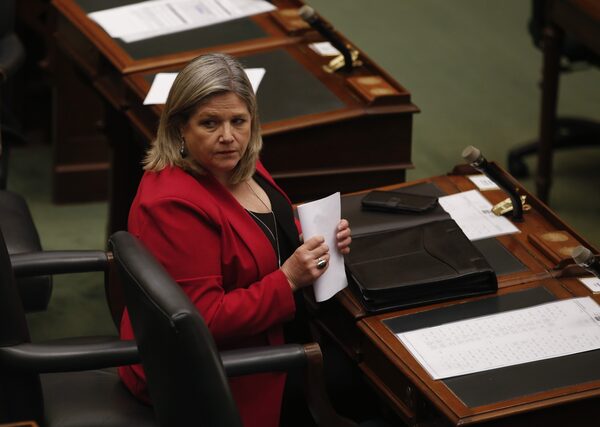Quebec Premier François Legault responds to the Opposition during question period at the legislature in Quebec City on March 15.FRANCIS VACHON/The Canadian Press
Quebec Premier François Legault is condemning this week’s Liberal-NDP deal as an intrusion in provincial affairs, predicting the proposals won’t fly with Canada’s premiers.
Echoing concerns he expressed during last year’s federal election campaign, Mr. Legault described the federal Liberals and NDP as two “very centralist” parties that are interfering in provincial areas such as health care.
Prime Minister Justin Trudeau and NDP Leader Jagmeet Singh unveiled a detailed agreement Tuesday that will see NDP MPs vote to keep the Liberals in power until June, 2025, in exchange for action on NDP policy priorities, including billions in increased health care spending in areas such as pharmacare and a new national dental-care program for lower-income Canadians.
What the Liberal-NDP power-sharing deal means for dental care, pharmacare and other key issues
Trudeau makes a deal to solidify his legacy on the left
Other premiers, including Alberta’s Jason Kenney and Saskatchewan’s Scott Moe, have also harshly criticized the deal. B.C. Premier John Horgan, however, expressed support and Doug Ford’s Ontario government has so far been muted in its response.
Mr. Legault was adamant that the deal would infringe on provincial authority. “I listened to what Mr. Trudeau had to say yesterday, and there will be a close confrontation with Quebec and all the provinces, including with Ontario,” he told reporters Wednesday in French. “It’s not true that Doug Ford will accept that Justin Trudeau decides how he administers the health budget.”
“I’m sorry but the federal government has no expertise to direct how much money we should be spending on long-term care, how much we should spend on mental health, how much we should devote toward hiring more nurses,” he said.
“I know there is a very strong common front from the provinces to say that health care is a provincial jurisdiction. But now we have two very centralist parties – the Liberal Party of Canada and the NDP – that want to impose this on all of the provinces. I think they will run into a wall.”
Canadian Heritage Minister Pablo Rodriguez during question period in Ottawa on March 23. Mr. Rodriguez, the federal cabinet’s Quebec lieutenant, defended the deal, saying the government’s critics can’t comprehend that some parties want to work together.Adrian Wyld/The Canadian Press
The Premier’s comments were promptly quoted on the floor of the House of Commons Wednesday by Conservative and Bloc Québécois MPs from the province as they criticized the deal.
Liberal Minister Pablo Rodriguez, the federal cabinet’s Quebec lieutenant, defended the deal, saying the government’s critics can’t comprehend that some parties want to work together.
“The fact that we want to sit down and talk about social housing, that’s good for Quebec. Fighting climate change is good for Quebec. Helping workers is good for Quebec. But unfortunately, it’s bad for the Bloc,” he said.
Mr. Kenney called the Liberal-NDP agreement an effort “to keep Trudeau in power through 2025, being backstopped by the anti-oil-and-gas NDP.”
“This is bad news for Alberta. There’s no sugarcoating it,” he said in a video posted Tuesday on social media.
Mr. Kenney has used the alliance to attack the opposition New Democrats in Alberta and tie the provincial party to the federal carbon tax.
“In case anybody is misunderstanding this: The Alberta NDP is a branch plant of Jagmeet Singh’s federal NDP, which is a branch plant of Justin Trudeau’s Liberal Party. And they’re all in cahoots to make life more expensive for Canadians,” Mr. Kenney said in the provincial legislature on Wednesday.
Mr. Horgan applauded the agreement, which mirrors the deal that allowed him to secure a minority government in 2017 with the support of the provincial Green Party.
“Glad to see political co-operation designed to help people,” he said on Twitter, adding that the premiers are ready to negotiate new health funding with Ottawa.
Mr. Ford hasn’t publicly responded to the Liberal and NDP deal since it was announced Tuesday.
Ontario Government House Leader Paul Calandra said the PC Party would need to see the federal dental and pharmacare plans before committing support.
“We’ll pay attention and we’ll see what the federal government has to offer,” Mr. Calandra said during Question Period Wednesday. “But, of course, we would not sign anything that isn’t in the best interests of the taxpayers of the province of Ontario.”

Ontario NDP Leader Andrea Horwath praised the federal deal as a way to provide dental care and prescription drugs to Canadians in need.Jack Boland/The Canadian Press
Mr. Calandra expressed concern about cross-party deals, pointing to a 1985 agreement between the Ontario Liberals and NDP to form government after the Progressive Conservatives won the most seats in the election.
He said this partnership led to increased debt and taxes in the province.
Ontario NDP Leader Andrea Horwath praised the federal deal as a way to provide dental care and prescription drugs to Canadians in need.
Both the Ontario Liberal and NDP parties haven’t ruled out working together in the case of a minority government after a provincial election scheduled for June and said they wouldn’t support another term for Mr. Ford.
Ontario Liberal Leader Steven Del Duca said he hasn’t had a conversation with Ms. Horwath but is open to working across party lines.
Michel Breau, the Canadian Dental Association’s head of advocacy and governance, said in an interview that his organization was surprised by Tuesday’s announcement of a national dental-care plan. He said there are still very few details about the pledge and that the CDA strongly recommends that Ottawa simply transfer funding to the provinces to improve their existing dental programs.
The NDP’s deal to back the minority Liberal government until 2025 in exchange for progress on key policies could have far-reaching implications. Columnist John Ibbitson says the deal puts pressure on the Liberals to deliver on issues like dental and Pharmacare, but means that Jagmeet Singh is acknowledging he may never be Prime Minister and that the NDP has accepted its role as the conscience of Parliament.
The Globe and Mail
With reports from James Keller in Calgary and Justine Hunter in Victoria
 Bill Curry
Bill Curry Dustin Cook
Dustin Cook